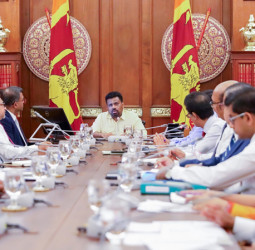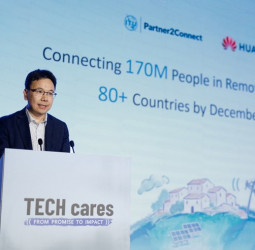FITIS Welcomes Budget 2025
President Anura Kumara Dissanayake’s 2025 budget marks a transformative step in Sri Lanka’s economic recovery, placing the digital economy at the core of the nation’s growth strategy. The Hon. President, in his budget speech, affirmed that the growth of the digital economy by 2030 will reach a value of $15 billion or increase to 12% of GDP. Recognizing the potential of digitalization to drive economic resilience and global competitiveness, the government has allocated significant resources to accelerate technological adoption, enhance digital infrastructure, and support businesses in transitioning to a fully digital environment.
A key highlight of the budget is the government’s commitment to investing into local companies, particularly in the technology sector, to position Sri Lanka as a regional leader in digital services. This includes initiatives to enhance broadband connectivity, expand e-governance services, and create a regulatory framework that fosters innovation. By prioritizing digital transformation, the government aims to modernize industries, improve efficiency, and attract foreign investment in Sri Lanka’s growing tech sector.
Alongside broader digitalization efforts, MSMEs remain a vital pillar of the government’s strategy. Representing over 75% of businesses and contributing approximately 52% of GDP, MSMEs play a crucial role in economic stability and job creation. The budget introduces targeted support programs to help MSMEs integrate digital tools, access new markets, and improve operational efficiency through technology. Incentives such as tax breaks for digital adoption, subsidized software solutions, and e-commerce training programs have been introduced to bridge the digital divide and ensure smaller businesses are not left behind.
The promotion of digital payments stands as the next major focus in the 2025 budget, aiming to create a cashless economy that is more efficient, secure, and transparent. To accelerate this shift, the government has introduced incentives for businesses to adopt digital payment systems, including lower transaction fees, tax benefits, and improved financial access for MSMEs. The expansion of mobile banking, fintech solutions, and QR code-based transactions is expected to bring millions into the formal financial sector while reducing reliance on cash-based transactions. The Central Bank has pledged to strengthen digital payment security and introduce new regulations to build consumer trust and encourage widespread adoption.
A major driving force behind Sri Lanka’s digital transformation is the Federation of Information Technology Industry Sri Lanka (FITIS), the country’s leading technology industry association. FITIS has played a critical role in promoting digital adoption across businesses, advocating for progressive policies, and leading initiatives to accelerate the country’s digital shift. One of its flagship programs, DigiGo, is specifically designed to empower MSMEs by providing them with access to affordable local digital services.
FITIS has officially welcomed the 2025 budget, praising its strong emphasis on digital transformation and financial technology. The organization has reaffirmed its commitment to working with the government to implement the digital economy strategy effectively, ensuring that businesses of all sizes can benefit from technological advancements. Through collaborations with global technology leaders, policymakers, and financial institutions, FITIS continues to drive digital adoption across industries, making technology more accessible for entrepreneurs and small businesses.
International partnerships are further strengthening Sri Lanka’s digital economy goals. The World Bank has pledged technical support to help shape a robust digital framework, ensuring that the nation’s policies align with global best practices. Additionally, the government is working on expanding free trade agreements and introducing updated regulations to support digital commerce, including streamlined customs processes and enhanced data protection laws.
Despite these ambitious initiatives, Sri Lanka faces challenges in fully realizing its digital transformation goals. Digital literacy remains a barrier, particularly in rural areas, where access to technology is still limited. Infrastructure gaps, cybersecurity concerns, and resistance to adopting digital payment solutions must also be addressed. To tackle these challenges, the government has committed to investing in digital education, expanding high-speed internet access, and launching cybersecurity awareness campaigns to build public trust in digital financial transactions.
President Anura Kumara Dissanayake’s 2025 budget signals a bold shift towards a digital-first economy, ensuring that technology-driven growth benefits all sectors of society. By prioritizing digital infrastructure, SME empowerment, and cashless payment systems, Sri Lanka is laying the foundation for a modern, resilient, and globally competitive economy. The collaboration between government, industry leaders like FITIS, and international stakeholders will be crucial in ensuring the successful execution of this vision, positioning Sri Lanka as a leader in digital innovation in the years to come.



 A.R.B.J Rajapaksha
A.R.B.J Rajapaksha



